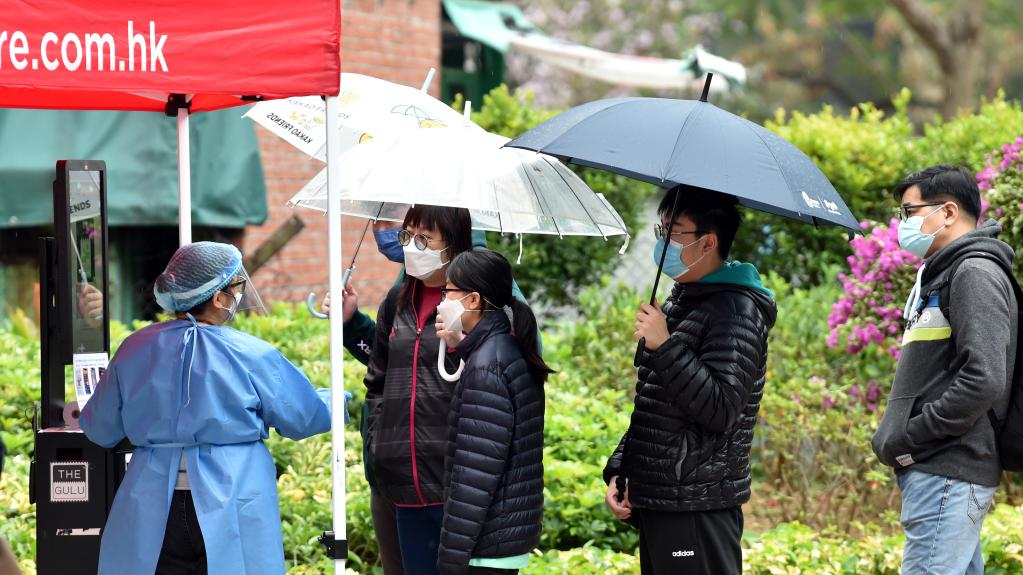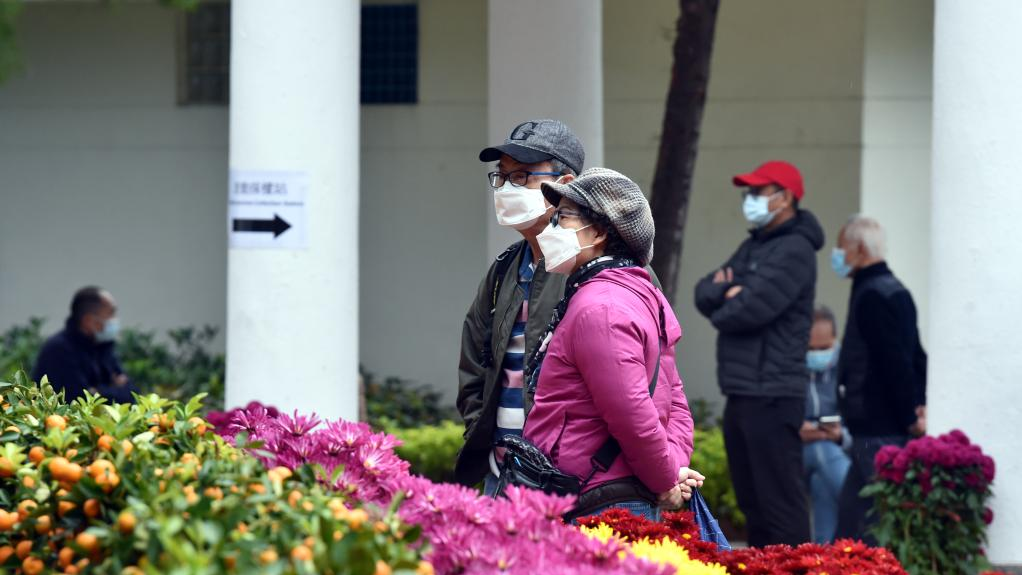
People wait for COVID-19 tests at a testing site in Hong Kong Special Administrative Region, south China, February 7, 2022. /Xinhua
People wait for COVID-19 tests at a testing site in Hong Kong Special Administrative Region, south China, February 7, 2022. /Xinhua
Editor's note: Timothy Kerswell is a research fellow at the Chinese University of Hong Kong (Shenzhen). He lived in Macao for seven years, working as an assistant professor at the University of Macao. The article reflects the author's opinions and not necessarily the views of CGTN.
Some of the more amusing Western reporting on China's Hong Kong Special Administrative Region's recent COVID-19 outbreak attempts to link the Hong Kong situation to broader political consequences. There has been a Western media propaganda offensive designed to create political pressure in favor of Hong Kong, and indirectly the Chinese mainland, adopting a "live with the virus" approach to COVID-19.
Outlets like the Financial Times have framed Hong Kong's recent dilemma as a tension between opening to the "rest of the world," a coded reference for the Western countries, and opening to China which depends on controlling the recent outbreak.
It's an astounding arrogance that Hong Kong should prioritize what is good for Western corporations and tourists, as opposed to what is good for its population and economic future which is inevitably tied to a deepening of integration with Chinese mainland. While China has legitimate reasons to ask Hong Kong SAR's government to do more to combat COVID-19, Western media criticisms have been hypocritical and hysterical in equal parts.
Having been through the experience of quarantine in both Hong Kong and in Shenzhen and living in both cities during the pandemic, I can speak from personal experience about the differences between the two approaches.
The pillars of the Chinese mainland's policy rely on the use of the health code app to track and trace movements, coupled with the government's preparedness to spend significant resources on mass testing. Outbreaks are responded to swiftly and resolutely by mobilizing local government and community volunteers and applying overwhelming restrictions on sites of infection placing the priority on keeping most of the community safe and returning to normal as quickly as possible.
China has a high degree of public trust in government, and this is reflected in a high degree of social cooperation with government policy and a high vaccination rate. All of this explains China's low rates of COVID-19 and low death rate.

People wearing face masks walk in a park in Hong Kong, south China, February 7, 2022. /Xinhua
People wearing face masks walk in a park in Hong Kong, south China, February 7, 2022. /Xinhua
Hong Kong's approach is in many ways a microcosm of the city's recent history, an attempt to straddle the relentless drive toward a profit motive and its historical experience of Western liberalism on the one hand, and its integration with Chinese mainland and the corresponding need for good public policy on the other.
Public trust in government was eroded by decades of Western interference and domestic liberal opposition, providing a bad starting point for any public policy. The Leave Home Safe app was designed as an "opt in" system, where individuals could choose to register their presence at a place or not according to preference and receive notifications of possible exposure. Individuals could choose to get tested at community health facilities, but no mandated mass public testing.
The vaccination rate has been consistently low, amplified by opposition parties spreading conspiracy theories and promoting vaccine hesitancy. However, the government response to the low vaccination rate was advertising and gentle (but ineffective) persuasion. This approach is even more liberal than many Western countries which have imposed restrictions on the movements of unvaccinated people.
Hong Kong's quarantine facilities are outsourced by the government to local hotels that assume the de facto management of quarantine. These hotels are in the middle of high population density areas of the city.
A wrist bracelet monitors your movements when you tap it against a health department issued phone. No testing takes place during the quarantine period and then suddenly on day 14 you're released into the community. It's not a major surprise that the eventual breach that led to Hong Kong's Omicron outbreak came from airline staff breaching this already lax quarantine protocol.
In neighboring Shenzhen, while hotels provide the physical infrastructure for quarantine, they are staffed by epidemic prevention teams. The hotels have been selected because they're far from major population centers.
There's no attempt to make a profit out of the quarantine experience which is provided at cost. Individual food delivery is possible but only occurs twice a day to minimize the throughput of people in the quarantine areas, and for the most part, people rely on centrally provided food. You get tested every few days, and once you're in the community, a testing staff comes to your home in full personal protection equipment gear for a few more tests.
So, Hong Kong's system might not be the best, as it lacks the integrity of the Chinese mainland. But let's put things in perspective before we listen to outlets like the Washington Post and other Western media call it a policy failure.
While the Chinese government and Chinese political commentators have the right to criticize Hong Kong's policy framework, the Western media and its governments have long lost any sense of legitimacy from which to lecture the rest of the world about what constitutes good public policy.
With the assistance of China's central government, Hong Kong is now scrambling to its testing and isolation infrastructure. On February 24, it will become mandatory to be vaccinated before entering most public venues.
In comparison to Chinese mainland, Hong Kong's case has shown that even a little bit of Western liberalism is hazardous to your health pointing to the importance of the continued decolonization of Hong Kong.
Once again, the mainland will answer the call in Hong Kong and will devote vast resources to get the situation under control. China is showing incredible patience with the very Western inefficiencies of Hong Kong's society and its system. But the last thing Hong Kong needs at this time of crisis is advice from some of the greatest failures of all.
(If you want to contribute and have specific expertise, please contact us at opinions@cgtn.com.)

